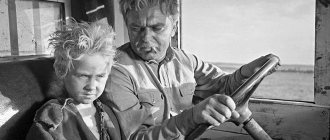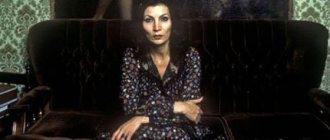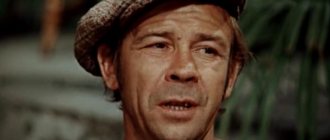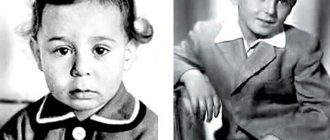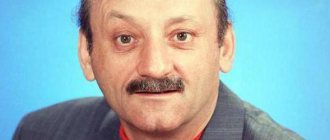Biography
Stanislav Sergeevich Govorukhin was born in the Perm region. His father, a Don Cossack, was repressed and died in Siberia in 1938. His mother worked as a dressmaker and raised Stanislav and his sister alone.
In 1958, Govorukhin graduated from the Faculty of Geology of Kazan University, but soon realized that he had made a mistake in his choice of profession. He went to television, where he worked as a journalist, program author and director at the Kazan television studio. Two years later he entered the directing department at VGIK, from which he graduated with honors in 1966. His graduation work was the film “Vertical”.
In 1959-1961, Govorukhin worked as an editor and assistant director at the Kazan television studio.
In 1966-1988 he was the director of the Odessa feature film studio.
In 1987, he took part in organizing the first International Genre Film Festival “Golden Duke” in Odessa.
In 1988-1993 he worked at Mosfilm.
Policy
In the 90s, Stanislav Govorukhin went into politics - he wanted to change the lives of his fellow citizens for the better. In August 1991, the director was near the White House - just at the moment when parliament was attacked by tanks. Later, the director will say that that victory was actually a defeat, because it exposed the incompetence of the ruling elite.
Stanislav Govorukhin in the State Duma
Govorukhin was a State Duma deputy. In 2000, he stood as a candidate for the post of President of the Russian Federation and received 0.44% of the votes. In 2005, the film director went over to the side of President Vladimir Putin, joining the United Russia party.
In mid-September 2020, Stanislav Govorukhin took the side of his colleague - director Alexei Uchitel, whose film is opposed by the Orthodox community, prosecutor Natalya Poklonskaya, who received 100 thousand signatures against the film, as well as many media personalities - fighter Fedor Emelianenko, cosmonaut Sergei Ryzhikov, artist Nikolai Burlyaev, traveler Fyodor Konyukhov and ballerina Ilze Liepa. The head of the State Duma Committee on Culture called the protesters “cliques and crazy people” and called on fellow citizens not to ignore watching the film.
Stanislav Govorukhin
The film director noted that all viewers who watched “Matilda” changed their attitude towards Emperor Nicholas II for the better.
Director
The pinnacle of Stanislav Govorukhin’s creativity was the five-part film “The Meeting Place Cannot Be Changed,” based on the novel “The Era of Mercy” by brothers Arkady and Georgy Weiner. In those five evenings, the country literally died out - people sat in front of their televisions.
Almost forty years have passed since the release of “The Meeting Place,” but the film still remains one of the most beloved, and many viewers still hope for its continuation. Stanislav Govorukhin abandoned this idea: “Zheglov is dead, Sharapov is old, with whom and why should we continue?”
In total, Stanislav Govorukhin shot more than 20 feature films, the most famous among them: “White Explosion”, “The Day of the Angel”, “The Life and Amazing Adventures of Robinson Crusoe”, “The Adventures of Tom Sawyer and Huckleberry Finn”, “In Search of Captain Grant”, “ Ten Little Indians,” “Voroshilov Shooter,” “Bless the Woman,” “Not by Bread Alone.” All of them are well known to the Russian public.
Later he made the films “Artist”, “Passenger”, “In the Style of JAZZ”, “Weekend”.
His latest film, “The End of a Beautiful Era” (2015), based on the story “Compromise” by Sergei Dovlatov, was awarded the Golden Eagle Award for best director. He himself considers this film his best. “I still think that this is my best film. Moreover, I decided not to film anything else at all, because it seems to me that there is nothing better to do.”
Stanislav Sergeevich speaks quite frankly about modern cinema and viewers: “The mass audience is becoming stupider and less educated from year to year. And the cinema adapts to it, so every year it gets worse. People came to the cinema who were not right in their souls, who were poorly educated and who did not read books. I hate today’s cinema,” Stanislav Sergeevich said in an interview with KP.
He was the artistic director of the Vertical film studio of the Mosfilm film concern.
Govorukhin’s films: from “Vertical” to “The End of a Beautiful Era”
Still from Stanislav Govorukhin’s feature film “Vertical” (1967)
From left to right: director Stanislav Govorukhin, assistant director Vladimir Maltsev and actor Vladimir Vysotsky during the filming of the film “Vertical”. Photo: echo.msk.ru
Stanislav Govorukhin on the set of the film “White Explosion”. Photo: realnoevremya.ru
While still at the institute, Govorukhin decided that he wanted to work at the Odessa Feature Film Studio.
I had never been there [to Odessa], but I knew this city from literature - Pushkin, Babel, Paustovsky, Bunin. Moreover, in those times of the rise and blossoming of Soviet cinema, films were made at the Odessa Film Studio that were distinguished by some kind of... freshness. “Spring on Zarechnaya Street”, “Come Tomorrow”, “Thirst” are my favorite films.
Stanislav Govorukhin about the Odessa Film Studio
In 1967, together with former classmate Boris Durov, Govorukhin went to Odessa. According to the plan, the film studio in this city was supposed to release five films in a year, but they did not have time to create the last one - about climbers. Govorukhin and Durov were offered to work on this picture. They had to work a lot on the future film - reworking the script, choosing music and actors. Govorukhin recalled: “We were offered a script, a very weak one, about climbers. We looked at the script, realized that even reworking it wouldn’t help, but we grabbed it anyway - when will we have the opportunity to make a full-length film again?” The composer was Sofia Gubaidulina from the Moscow Experimental Electronic Music Studio, and Vladimir Vysotsky was invited to play the main role. Over the course of the year, “Vertical” was watched by more than 30 million people. “Song about a Friend,” which was featured in the film, was one of the most popular in 1967, and Vladimir Vysotsky became famous.
After the success of "Vertical", Stanislav Govorukhin decided to make another film about climbers - the film "White Explosion", which was released in 1969. He remembered his filming for the rest of his life: then a helicopter with a director and a stuntman crashed into a rock and fell.
There was absolutely no chance of survival; the helicopter fell into pieces. But for some strange reason - the Lord took it away - it did not explode or catch fire. Everyone broke down, but everyone survived. Of course, this event is forever etched in my heart. I consider this day the happiest in my life.
Stanislav Govorukhin about the helicopter crash on the set of “White Explosion”
The film did not gain popularity, but the director himself considered it one of his best works.
Stanislav Govorukhin (right) and actor Vladimir Konkin on the set of the film “The meeting place cannot be changed.” Photo: biographe.ru
From left to right: Stanislav Govorukhin, actors Vladimir Vysotsky and Stanislav Sadalsky on the set of the film “The meeting place cannot be changed.” Photo: gazeta.ru
Stanislav Govorukhin as Andrei Krymov and Tatyana Drubich as Alika in the feature film “Assa” by Sergei Solovyov (1987)
Over the next few years, Govorukhin made adventure films - the film “The Life and Amazing Adventures of Robinson Crusoe” based on the book of the same name by Daniel Defoe and “Contraband”. In 1977, the director worked on a film about the cadets of the naval school, “The Wind of Hope.” And in 1979, he wrote the script for the action movie “Pirates of the 20th Century,” which became the highest-grossing film in the history of Soviet cinema. In 1980, the film was watched by more than 90 million people. Soon, a five-part detective film about employees of the Moscow Criminal Investigation Department, “The Meeting Place Cannot Be Changed,” was released, starring Vladimir Vysotsky and Vladimir Konkin. The plot is based on the novel “The Era of Mercy” by Arkady and Georgy Weiner. The film was very popular with viewers, Stanislav Govorukhin recalled: “In the first years during the screenings, the country died out - crimes stopped and national holidays were disrupted; people were sitting in front of televisions.”
After the detective story “The Meeting Place,” Govorukhin returned to adventure films. This time he took plots from foreign literature - in 1981 he filmed Mark Twain's story "The Adventures of Tom Sawyer and Huckleberry Finn", and in 1985 - Jules Verne's novel "The Children of Captain Grant". Govorukhin himself acted in films - he played in episodes.
At the same time, Stanislav Govorukhin began writing essays about politics and cinema. They were published in Literaturnaya Gazeta, Soviet Culture, and other newspapers and magazines. The director did not give up his work in cinema: in 1987 he played the role of crime boss Andrei Krymov in the film “Assa” by Sergei Solovyov.
In the early 1990s, the director began making documentaries. The first to come out was “You Can’t Live Like This.” The film talked about the other side of perestroika - unemployment and poverty. Filming took place in the director's hometown - Berezniki. In 1991, “You Can’t Live Like This” received three Nika awards: for best documentary film, best work of director and screenwriter. Success pushed Govorukhin to film a sequel - he decided to create a film trilogy about turning points in history. In 1992, he directed the film “The Russia We Lost,” about the reign of Nicholas II and the events of 1917, and in 1994, the film “The Great Criminal Revolution,” about the last years of Soviet power. Later, the director released a book with notes that he took while working on this trilogy. In the book, Govorukhin reflected on the political situation in contemporary Russia.
The last film expressed all my disappointment with what happened in the country. They planned democratic reforms, but they turned out to be criminal. And given the fact that our country is enormous, I called this criminal revolution great.
Stanislav Govorukhin
In 1993, Govorukhin made a documentary film “The Hour of Scoundrels” about the shooting of the White House. And in the summer of 1998, the director began work on the crime drama “The Voroshilov Shooter” - an adaptation of Viktor Pronin’s story “Woman on Wednesdays”. The film was about how an ordinary pensioner took revenge on the rapists of his granddaughter. The film received negative reviews from critics. “Voroshilov shooters” began to be called people who committed lynching. Rossiyskaya Gazeta journalist Vladimir Bogdanov wrote: “The scary thing is that the image of the “Voroshilov shooter” is approved. Perhaps the thought of lynching arises as a response to the persistent belief that you will not get a fair trial.”
After the crime drama, Govorukhin filmed the melodrama “Bless the Woman” with Svetlana Khodchenkova in the title role. Stanislav Govorukhin’s latest work was the 2020 film “The End of a Beautiful Era” - an adaptation of the works of Sergei Dovlatov. After the director’s death, in 2020, the film “To Paris” was released, which was filmed according to his script.
Screenwriter
Govorukhin wrote scripts for the films “White Explosion”, “Invasion” (1978), and the first Soviet action film “Pirates of the 20th Century” (1978). Based on his scripts, the films “The Secrets of Madame Wong” (1986), “Russian Revolt” (1993), “Moscow Nights” (1994), “Black Veil” (1995), etc. were filmed.
Illness and death of Stanislav Govorukhin
Over the past years, the director has been struggling with a serious illness. At the beginning of the summer of 2020, reports appeared in the media that the director had died. This information was immediately refuted by Govorukhin’s press secretary Maria Shoppo. According to the woman, the director was put into a medically induced coma, but was later brought out of this state.
On June 14 of the same year, reports of the death of Stanislav Govorukhin again appeared in the press. Unfortunately, this time the information was confirmed. According to the artist’s friends, the director and politician died in the Barvikha sanatorium.
Artist
Govorukhin played leading roles in the films “Among the Gray Stones”, “Assa”, “Ka-ka-du”, and in the TV series “Women’s Logic”. He also starred in the films “Sons of Bitches”, “Anchor, More Anchor”, “The Joys and Sorrows of a Little Lord”, “9th Company”, in his films “Bless the Woman”, “Not by Bread Alone”, “Passenger”, etc.
In 2020, the Rossiya TV channel is preparing for its viewers a new grandiose saga about the fate and family of one of the most prominent rulers of Rus' - Boris Godunov. The most important and fateful events for Boris Godunov and the whole country will be reflected in the multi-part film. Filming of the series is already underway in Moscow. In the series “Godunov” Stanislav Sergeevich will play the role of Patriarch of Moscow and All Rus' Hermogenes, a famous figure of the Time of Troubles.
The most interesting
Actresses with big noses (03/22/2018)
Actresses who overcame alcohol addiction (05/15/2019)
The artist’s next passion was Anna Gorshkova, who worked on the filming of the film “Passenger”. However, this relationship also ended quite quickly. Elena Dudina came to the theater to replace Gorshkova. At the same time, the wife did not even pay attention to the fact that photos of her chosen one often ended up on the pages of the yellow press.
In the photo: Stanislav Govorukhin and Anna Gorshkova
Each time Govorukhin returned to Galina. The wife forgave the artist literally all his shortcomings and realized that the creator needed some kind of inspiration, which he found in young actresses.
Stanislav Govorukhin
On the Internet you can find photos that display the entire personal life of Stanislav Govorukhin. There is also a photo where the artist is captured during his acting, directing and political activities.
Personal life
Stanislav Govorukhin is married for the second time. His first wife was Honored Artist of Tatarstan, theater teacher Yuno Kareva (1933-2013). The second wife, Galina, formerly worked as an editor at the Odessa film studio.
The son from his first marriage, Sergei Govorukhin, a director and writer, as a war correspondent took part in hostilities and special operations in Tajikistan, Chechnya, Afghanistan and Yugoslavia, was seriously wounded, and was awarded the Order of Courage. At the age of fifty, Sergei died.
Personal life of the director
Juno Kareva is the first wife of Stanislav Govorukhin. Photo: stuki-druki.com
Director Sergei Govorukhin (right) is the son of Stanislav Govorukhin from his first marriage. Photo: Cinema Press Service / kinokadr.ru
Galina Govorukhina is the second wife of Stanislav Govorukhin. Photo: kulturologia.ru
Govorukhin met his first wife, Juno Kareva, while working on Kazan television. Kareva at that time worked at the Kazan Bolshoi Drama Theater. In 1961 they got married, and at the same time the couple had a son, Sergei. Soon the marriage broke up: Stanislav Govorukhin left for Moscow, and Juno Kareva refused to leave her hometown. The son stayed with his mother and in the future also became a director.
He [Sergei Govorukhin] was brought up on books. I was eager to serve in Afghanistan, but my mother laid down her bones and didn’t let me. But this disease of war, which was brought up by courageous books, did not go away. And he, having graduated (and in absentia, he always worked) from the screenwriting department of VGIK, decided to make a documentary about the war. With the camera they went through Tajikistan and Chechnya, all the hot spots. He has medals on his chest, he lost a leg in Chechnya, but they made a documentary film “Cursed and Forgotten”, which received the Nika Award, the highest Russian cinematographic award.
Stanislav Govorukhin about his son Sergei Govorukhin
The director met his second wife in Odessa while working on the film “Vertical” in 1967. She worked at the Odessa film studio as an editor. Stanislav and Galina Govorukhin lived together for almost fifty years.
Titles and awards
Stanislav Govorukhin - People's Artist of Russia (2006).
Among his awards are the Nika Prize (1990), the Montreal International Film Festival (1990), the Golden Knight (1994), the Literature and Cinema film festivals in Gatchina (1997, 2000, 2004, 2006, 2008, 2009), “ Kinotavr" (1999), "Window to Europe" (2005, 2007, 2008), etc.
In 2020, the director was awarded the Golden Eagle award for his contribution to the development of Russian cinema. In 2020, he was recognized as the best director of the year according to the Golden Eagle Award.
In 2011, the Sergei Govorukhin Prize was established by the Stalker Film Festival; in 2012, the Rokada International Foundation for Veterans of Armed Conflicts established the Sergei Govorukhin “Sacrificial Heart” memorial medal.
Based on materials from the sites: KinoPoisk, Rossiya TV channel, StarAndStar.ru, Kino-teatr.ru, Lifeactor.ru, RIA Novosti, AiF.
Son of Stanislav Govorukhin - Sergei Govorukhin
It is known that the son of Stanislav Govorukhin, Sergei Govorukhin, followed in the footsteps of his outstanding father and worked as a screenwriter, director and producer. In addition, he was also a very good writer. Why was it? It so happened that Sergei Govorukhin died seven years before his father. He was fifty years old at that time.
It is known that Sergei held a grudge against his father for the reason that he left the family at one time. However, when Govorukhin Jr. was hospitalized with a stroke, Stanislav Sergeevich was with his son until the last minute. It is not known for certain whether Sergei forgave his father. Be that as it may, after the death of his son, Govorukhin Sr. tried to devote as much time as possible to his grandchildren.
Filmography: Actor
- Vladimir Zeldin. Don Quixote in Love (2010), documentary
- Love-carrot-3 (2010)
- Reporters (2008)
- Passenger (2008)
- Artist (2007)
- Women's Logic-5 (2006)
- 9th company (2005)
- Not by Bread Alone (2005)
- Women's Logic-4 (2004)
- Women's Logic-3 (2003)
- The Joys and Sorrows of the Little Lord (2003)
- Bless the Woman (2003)
- Tomorrow will be tomorrow (TV series) (2003)
- Women's Logic-2 (2003)
- Women's Logic (2002)
- Dear friend of long-forgotten years... (1996)
- Heads and Tails (1995)
- The Outsider (1993)
- Anchor, more anchor! (1992)
- The Russia We Lost (1992)
- Ka-ka-doo (1992)
- And the wind returns... (1991)
- Sons of Bitches (1990)
- You can't live like this (1990)
- Assa (1988)
- Among the Gray Stones (1983)
- Return of Butterfly (1982)
Filmography: Director
- The end of a wonderful era (2015)
- Weekend (2013)
- Hearts of Four (2010)
- Passenger (2008)
- Artist (2007)
- Not by Bread Alone (2005)
- Chess Player (2004)
- Bless the Woman (2003)
- Voroshilovsky shooter (1999)
- The Great Criminal Revolution (1994)
- The Russia We Lost (1992)
- You can't live like this (1990)
- Champagne Splash (1988)
- Ten Little Indians (1987)
- In Search of Captain Grant (1985)
- The Adventures of Tom Sawyer and Huckleberry Finn (1981)
- The meeting place cannot be changed (1979)
- Pirates of the 20th Century (1979)
- Wind of Hope (1977)
- Contraband (1974)
- The Life and Wonderful Adventures of Robinson Crusoe (1972)
- White Explosion (1969)
- Angel's Day (1968)
- Vertical (1967)
Filmography: Screenwriter
- Hearts of Four (2010)
- In June '41 (2008)
- Bless the Woman (2003)
- Russian Riot (2000)
- Voroshilovsky shooter (1999)
- Black Veil (1995)
- Moscow Evenings (1994)
- Katya Izmailova (1994)
- The Great Criminal Revolution (1994)
- The Russia We Lost (1992)
- You can't live like this (1990)
- Champagne Splash (1988)
- Ten Little Indians (1987)
- Mysteries of Madame Wong (1986)
- In Search of Captain Grant (1985)
- Invasion (1981)
- The Adventures of Tom Sawyer and Huckleberry Finn (1981)
- Pirates of the 20th Century (1979)
- Wind of Hope (1977)
- Contraband (1974)
- White Explosion (1969)

